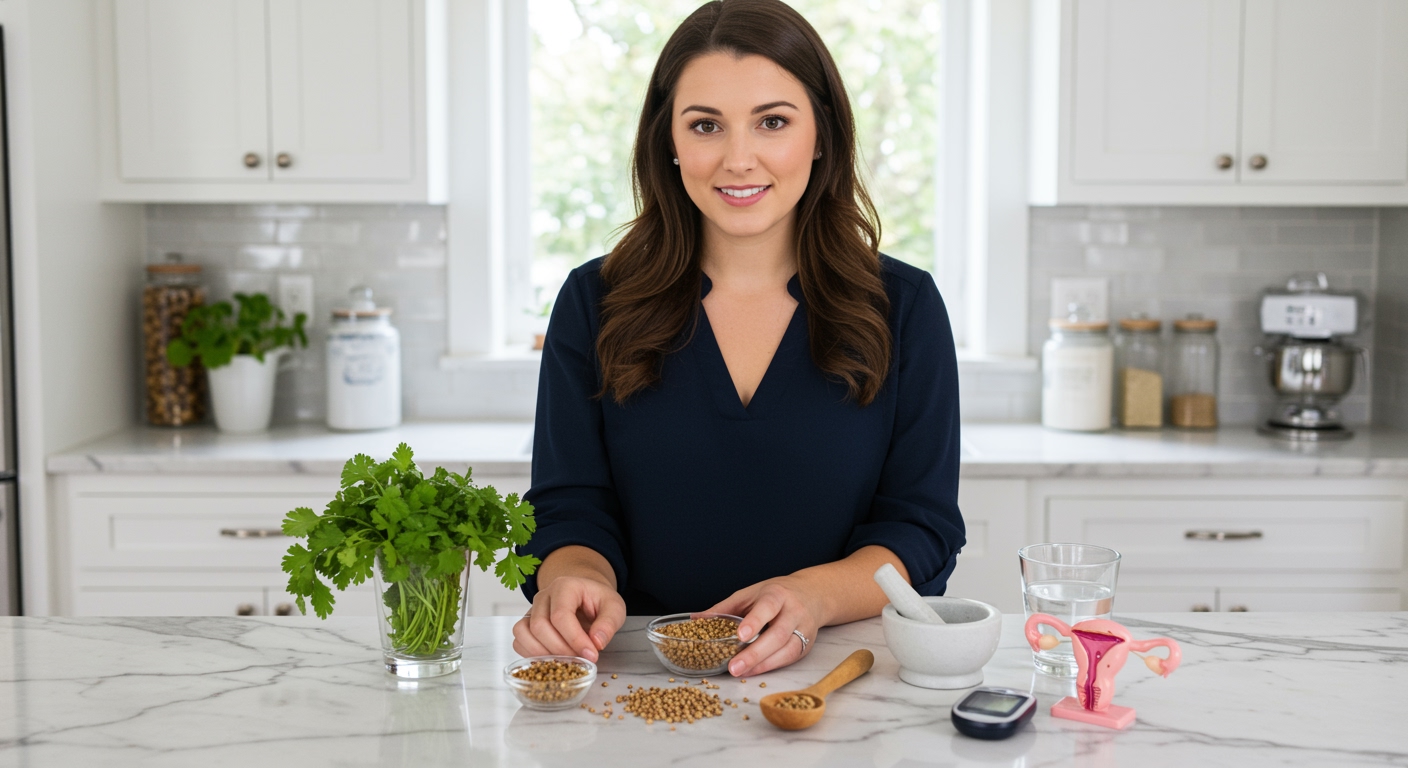✪ Key Takeaway: Coriander may help PCOS by improving insulin sensitivity and reducing inflammation, but works best as part of complete lifestyle changes.
Introduction
You sprinkle it on your curry without thinking twice, but coriander might be doing more than just adding flavor to your meals.
Women with PCOS often search for natural ways to manage their symptoms because traditional treatments sometimes fall short or come with unwanted side effects.
Hi, I am Abdur, your nutrition coach and today I am going to explain how this humble spice might support your PCOS management journey.
What Makes Coriander Special For PCOS?
Coriander contains bioactive compounds that directly target several PCOS-related problems in your body.
The seeds are packed with antioxidants like quercetin and kaempferol that fight the chronic inflammation common in PCOS.
Research shows these compounds help reduce oxidative stress, which damages your cells and worsens insulin resistance.
Fresh coriander leaves contain different but equally important nutrients including vitamin K, folate, and potassium.
Both the seeds and leaves work together to support your body’s natural healing processes.
✪ Fact: Coriander seeds contain up to 20 different antioxidant compounds that work synergistically to reduce inflammation.
How Does Coriander Affect Insulin Resistance?
Insulin resistance is the root cause of most PCOS symptoms, and coriander shows promise in addressing this core issue.
Studies indicate that coriander seed extract can improve glucose uptake by your muscle cells, similar to how diabetes medications work.
The spice appears to activate certain cellular pathways that make your cells more responsive to insulin signals.
This improved insulin sensitivity can lead to better blood sugar control throughout the day.
When your insulin works more effectively, your ovaries produce less testosterone, which helps reduce many PCOS symptoms.
However, these effects are modest and work best when combined with proper diet and exercise habits.
✪ Pro Tip: Consume coriander with meals containing carbohydrates to maximize its blood sugar stabilizing effects.
Can Coriander Help Balance Hormones?
Hormone imbalance in PCOS involves elevated androgens (male hormones) and disrupted reproductive cycles.
Coriander may help by reducing the chronic inflammation that triggers excess androgen production in your ovaries.
Some research suggests that regular coriander consumption might support liver detoxification, helping your body clear excess hormones more efficiently.
The spice also contains compounds that may help regulate cortisol levels, your primary stress hormone.
High cortisol worsens insulin resistance and can disrupt your menstrual cycle, so managing stress hormones is crucial for PCOS.
While promising, these hormonal effects need more research to be considered definitive treatment options.
✪ Note: Hormonal changes from dietary interventions typically take 3-6 months to become noticeable in PCOS management.
What Is The Best Way To Use Coriander For PCOS?
The most effective approach involves using both coriander seeds and fresh leaves in your daily routine.
Soak one teaspoon of whole coriander seeds in water overnight, then drink the water first thing in the morning.
You can also grind the seeds into powder and add half a teaspoon to your smoothies or yogurt daily.
Fresh coriander leaves work best when added to cooked meals rather than eaten raw in large quantities.
Start with small amounts and gradually increase to avoid digestive upset, especially if you have a sensitive stomach.
Consistency matters more than quantity, so aim for daily use rather than large occasional doses.
✪ Pro Tip: Buy whole coriander seeds and grind them fresh for maximum potency, as pre-ground spices lose their beneficial compounds quickly.
Are There Any Side Effects Or Precautions?
Coriander is generally safe for most people when used as a culinary spice in normal amounts.
Some individuals may experience allergic reactions, especially if they are sensitive to other plants in the carrot family.
Large medicinal doses might cause digestive upset including nausea, diarrhea, or stomach cramps in sensitive people.
If you take diabetes medications, monitor your blood sugar closely as coriander might enhance their effects.
Pregnant women should stick to culinary amounts and avoid concentrated extracts or supplements without medical supervision.
Always consult your healthcare provider before using coriander medicinally, especially if you have other health conditions.
✪ Note: Stop using coriander medicinally and consult a doctor if you experience persistent digestive issues or unusual symptoms.
The Bottom Line
Coriander shows genuine promise as a supportive tool in PCOS management, particularly for improving insulin sensitivity and reducing inflammation.
Small consistent actions with natural foods often create bigger changes than dramatic short-term interventions.
I would love to hear about your experiences with coriander or any questions you have about using herbs for PCOS support in the comments below.
References
At NutritionCrown, we use quality and credible sources to ensure our content is accurate and trustworthy. Below are the sources referenced in writing this article:
- Journal of Reproductive Health and Medicine: A Review on the Pharmacological Potential of Indian Spices in Polycystic Ovarian Syndrome
- PMC: Nutritional and Therapeutic Potential of Coriander
- Wiley Online Library: Herbal Medicine for PCOS Management
- Martha McKittrick Nutrition: Antioxidant Rich Spices and Herbs for PCOS





